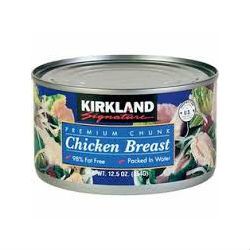Top Class Actions’s website and social media posts use affiliate links. If you make a purchase using such links, we may receive a commission, but it will not result in any additional charges to you. Please review our Affiliate Link Disclosure for more information.

In their Costco class action lawsuit, plaintiffs Mary La Vigne, Kristen Hessler, and Kathleen Hogan argued that the label on Costco’s Kirkland store brand canned chicken misleads consumers into believing they’re receiving more chicken than what is actually in the can.
However, U.S. District Judge Nelson S. Román was unconvinced, ruling in Costco’s favor.
In his argument countering the Costco canned chicken class action lawsuit’s claim that the cans’ labeling and packaging was misleading, Judge Román outlines a number of reasons why he sees this assertion as inaccurate.
According to the Costco class action lawsuit, Kirkland canned chicken comes in “cans…filled with useless water, conveying the impression that the cans will have a substantial amount of chicken.” Based on this, La Vigne and others claimed that the packaging was deceptive.
Judge Román determined that it is unreasonable for a consumer to expect they are receiving a certain amount of product based solely on the size and shape of the product’s packaging, citing a number of cases in which a similar decision was made. The judge then noted that it was important to consider the packaging as a whole when determining if it is deceptive — package size in conjunction with labeling.
Though La Vigne and the other plaintiffs also put forth the argument that the labeling itself was deceptive, the judge disagreed.
He notes that labels on both the bulk packaging and individual cans indicate that the chicken is packed in water, and that the information on the Nutrition Facts label applies to servings of “drained” chicken. Based on the labeling, Judge Román asserts that reasonable consumers wouldn’t be misled into believing that the cans contained no water.
Further establishing that the cans were not mislabeled, the judge notes that the labels received approval from the U.S. Department of Agriculture’s Food and Safety Inspection Service (FSIS). La Vigne and others did not contest that approval, suggesting that the labeling had previously been established to be accurate.
The Costco canned chicken class action lawsuit claimed that Costco violated state laws requiring the disclosure of a water-to-meat ratio in poultry packaging. The judge determined that in the Costco canned chicken class action lawsuit, state laws regulating the labeling of poultry were preempted by federal laws.
Judge Román states that though state laws in New York do require the percentage of liquid in canned meats to be disclosed, “when a poultry product is subject to and passes the pre-approval process by FSIS, a plaintiff’s claim under state statute alleging at the product is deceptive is expressly preempted by the PPIA (Poultry Products Inspection Act.)”
As Costco’s labels were pre-approved, the company committed no violation, Judge Román ruled.
The plaintiffs are represented by Patricia Avery, Matthew Insley-Pruitt, and Robert Plosky of Wolf Popper LLP.
The Costco Canned Chicken Deceptive Labeling Class Action Lawsuit is La Vigne, et al. v. Costco Wholesale Corporation, Case No. 7:16-cv-07924-NSR, in the U.S. District Court for the Southern District of New York.
ATTORNEY ADVERTISING
Top Class Actions is a Proud Member of the American Bar Association
LEGAL INFORMATION IS NOT LEGAL ADVICE
Top Class Actions Legal Statement
©2008 – 2024 Top Class Actions® LLC
Various Trademarks held by their respective owners
This website is not intended for viewing or usage by European Union citizens.















2 thoughts onCostco Wins Underfilled Canned Chicken Class Action Lawsuit
Please add me.
add me